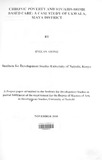| dc.contributor.author | Awino, Evelyn | |
| dc.date.accessioned | 2013-05-21T05:56:02Z | |
| dc.date.available | 2013-05-21T05:56:02Z | |
| dc.date.issued | 2010 | |
| dc.identifier.citation | Masters of Arts in Development Studies, | en |
| dc.identifier.uri | http://erepository.uonbi.ac.ke:8080/xmlui/handle/123456789/23992 | |
| dc.description.abstract | Strong links between HIV/AIDS and poverty have been demonstrated, with AIDS deepening poverty in the affected household. Chronic ill health creates immense stress, even among the financially secure. However, stress levels escalate sharply when chronic illness is combined with chronic poverty or entry into poverty. In Kenya the declaration of HIV/AIDS as a national disaster was followed by development of home based care by NASCOP as the best approach of taking care of the infected at home. This approach has been seen as impacting negatively on the care givers because of the multiple expenses that are involved in it.
This study explored the roles played by care givers in HBC and the implication of these roles on their poverty situation. The study surveyed households in Ukwala Siaya District Nyanza province which has the highest poverty rate and HIV/AIDS prevalence. The study also looked at coping mechanisms employed by the families affected and infected. The study involved the use of both primary and secondary sources of data. The data collection was accomplished using open and closed ended questionnaire, focused group discussion and observation check list.
The study found out that caregivers played myriad of roles which affected their livelihood. Majority of the respondents resorted to selling their properties when faced with hard situation in order to survive. The study also established that most of the care givers have not had basic training on HBC which is a very vital tool for people taking care of people infected with HIV/AIDS.
Finally the study makes recommendation and suggestion on policy implication. Efforts to alleviate poverty should have clear guidelines on how to assist those affected and infected with HIV/AIDS in terms of general awareness on HIV/AIDS, prevention and care.
In conclusion the study emphasizes the importance of supporting the care givers both materially and morally. This is already being done by some NGOs and CBO. The question however is what about those who are not near such organizations? The study recommends that the government should step in and not only play coordination role but also take active role in areas where there are no NGOs and CBOs | en |
| dc.language.iso | en | en |
| dc.publisher | University of Nairobi | en |
| dc.title | Chronic poverty and HIV/AIDS Home based care: A case study of Ukwala, Siaya District | en |
| dc.type | Thesis | en |
| local.publisher | Institute for Development Studies | en |

